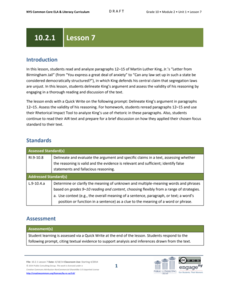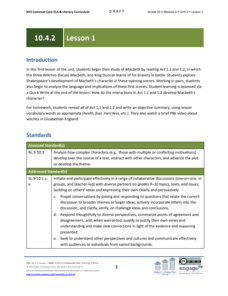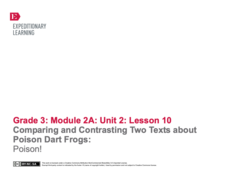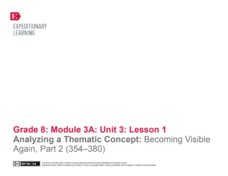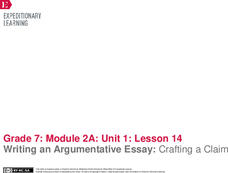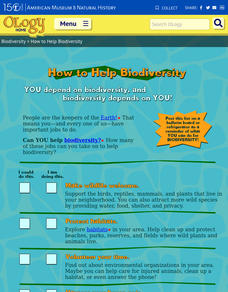Reed Novel Studies
Danny The Champion of The World: Novel Study
Many children dream about being a champion. The dream could be reality for Danny in Danny the Champion of the World. Danny's championship is a sure thing if he and his father gain victory against a nasty landowner with a bad attitude....
Howard Hughes Medical Institute
How Did Dinosaurs Regulate Their Body Temperature?
Are dinosaurs more like birds or reptiles? Learners put the question to the test by analyzing body temperature data from a 2014 study. With their analysis, they develop a theory about the body temperature regulation of dinosaurs.
Howard Hughes Medical Institute
Distribution of Elements in Earth’s Crust
How do scientists know the difference between a meteorite from space and a regular rock from the earth? Scholars read a passage and answer comprehension questions about the creation of the solar system. They extrapolate the main ideas to...
EngageNY
Grade 10 ELA Module 2: Unit 1, Lesson 7
Scholars read King's "Letter from Birmingham Jail" paragraphs to identify his arguments and reasoning. They discuss their ideas in pairs and small groups, complete a Model Argument Delineation Tool, and respond to a quick writing prompt.
EngageNY
Grade 10 ELA Module 2: Unit 1, Lesson 15
Some things are worth doing again. Scholars take a look to see which ideas Martin Luther King Jr. revisits and refines in his "Letter from Birmingham Jail." To help with the process, readers answer guided questions, look at word...
EngageNY
Grade 10 ELA Module 2: Unit 2, Lesson 4
What does it mean to come undone? Scholars consider the author's use of the phrase as they read paragraphs 12–15 from Julia Alvarez's autobiographical essay "A Genetics of Justice." They complete a quick write to analyze how Alvarez...
EngageNY
Grade 10 ELA Module 2: Unit 3, Lesson 2
Is good good enough? Scholars examine claims made in a speech by Elanor Roosevelt. Roosevelt claims that people should adopt the Universal Declaration of Human Rights because it is a good document. Readers discuss their ideas in pairs,...
EngageNY
Grade 10 ELA Module 3: Unit 1, Lesson 7
How did it happen? Scholars examine how the author describes the order of events in an excerpt from The Immortal Life of Henrietta Lacks. Learners use a Surfacing Issues Tool to guide their thoughts. Finally, they share ideas in pairs...
EngageNY
Grade 10 ELA Module 4: Unit 2, Lesson 1
What do readers discover about a character within the first few sections of a text? Pupils begin reading Shakespeare's Macbeth and analyze the language in the first few scenes of the play. They also demonstrate understanding with a Quick...
EngageNY
Comparing and Contrasting Two Texts about Poison Dart Frogs: Poison!
Scholars compare and contrast two informational texts about Poison Dart Frogs. A brief vocabulary review and discussion lead the way to a two-part close reading—the first reading for gist the second reading for details. Followed by a...
EngageNY
Grade 10 ELA Module 4: Unit 3, Lesson 3
What's the difference between men and princes? Machiavelli discusses this distinction in chapter 18 of The Prince. Scholars first listen to a masterful reading of the chapter. Then, they write about how the author develops a central idea...
EngageNY
Grade 10 ELA Module 4: Unit 3, Lesson 1
Is it better to be loved or feared? Using the resource, scholars explore Machiavelli's nonfiction text, The Prince, and examine the author's ideas about the role of leadership. Pupils also complete a Quick Write to analyze a central idea...
EngageNY
Grade 11 ELA Module 1: Unit 3, Lesson 3
Virginia Woolf didn't believe a woman could have written Shakespeare's works. Using the resource, scholars engage in a silent discussion to analyze how Woolf uses rhetoric to convey her point of view in A Room of One's Own. Pupils write...
EngageNY
Grade 11 ELA Module 1: Unit 3, Lesson 2
What was life like for William Shakespeare's sister, Judith? Scholars continue reading Virginia Woolf's A Room of One's Own to find out. They complete a Quick Write to explain how Woolf's comparison of the siblings develops a central...
EngageNY
Grade 11 ELA Module 2: Unit 1, Lesson 10
What are you implying? Scholars look at paragraphs eight and nine of the chapter "Of Our Spiritual Strivings" to determine the implications of Du Bois's use of metaphors. In groups, readers discuss the use of metaphors and add their...
EngageNY
Grade 11 ELA Module 2: Unit 1, Lesson 19
Scholars look at paragraphs two and three in the "Atlanta Compromise" speech. They analyze how Washington uses a story about a ship lost at sea and rhetorical devices to develop his point of view. After class discussion and completing...
EngageNY
Analyzing Character and Theme: Tracking Control in A Midsummer Night’s Dream
Scholars examine how characters try to control one another in Shakespeare's A Midsummer Night's Dream. They engage in a read-aloud and class discussion to iron out ideas. They also work in small groups to complete a note-catcher...
EngageNY
Analyzing a Thematic Concept: Becoming Visible Again, Part 2 (354–380)
Scholars take a close look at the life of Louie in Unbroken. They discuss events considered turning points in their life and use several graphic organizers and guides to help direct their thinking. After thinking about their responses,...
Purdue University
Mammal Food Webs
You are what you eat—or at least a part of what you eat. Budding scientists examine owl pellets to develop their own food webs. They use tooth and skull identification techniques to classify what they find.
Purdue University
Healthy Water, Happy Home
Clear water does not mean clean water. A collaborative lesson plan has groups play a board game to identify sources of water pollution and develop strategies for improving water quality. Their investigations include reference to the...
EngageNY
Preparation for Performance Task: Using Writing to Make Prompt Cards
Writing becomes dynamic in a presentation. Presenters transform a piece of writing they have already composed about the Little Rock Nine into a presentation. The focus is transferring ideas from their writing into short prompts on cards...
EngageNY
Reading for Gist and Answering Text-Dependent Questions: Local Sustainable Food Chain
Readers use sticky notes and a Reading Closely: Guiding Questions handout to record the gist of a different section (pages 161-166) in The Omnivore’s Dilemma. They then pair up and share their ideas. To end the lesson, readers complete...
EngageNY
Writing an Argumentative Essay: Crafting a Claim
As scholars prepare to craft their essays based on Katherine Paterson's Lyddie, they learn about using compelling reasons in their writing. Next, they develop a claim about whether Lyddie should sign a petition to speak out against...
American Museum of Natural History
How to Help Biodiversity
A resource provides a checklist of nine actions for pupils to take to do their part in supporting biodiversity. The list suggests more obvious actions such as supporting wildlife to less obvious ideas like learning about different...
Other popular searches
- Prek Vocabulary Development
- Vocabulary Development Games
- Adult Vocabulary Development
- Art Vocabulary Development
- Esl Vocabulary Development
- Vocabulary Development Math
- Perk Vocabulary Development
- Asl Vocabulary Development





